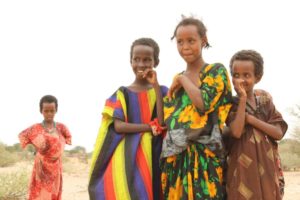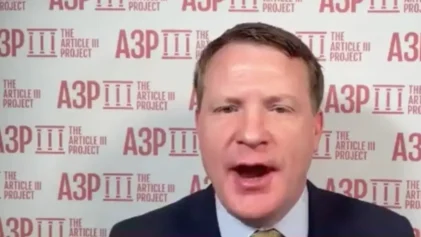
NGOs, aid agencies, missionaries and U.N. peacekeepers have reportedly committed thousands of sexual crimes in Black nations. (Photo: Wikimedia Commons)
The Oxfam sex scandal has once again placed on the front burner the issue of abuse against vulnerable Black bodies by the international aid community, charities, United Nations peacekeepers and missionaries.
Following the devastating 2010 earthquake in Haiti — which left 220,000 people dead, 300,000 injured and 1.5 million homeless — Roland van Hauwermeiren, Oxfam’s Haiti country director, used prostitutes at charity-paid premises, amid the misery of one of the world’s poorest nations. Oxfam male officials also allegedly used women and girls in Chad in 2006, in what many men working in developing nations view as a “perk of the job.” The dire poverty and misery following natural disasters attracts sex traffickers who hope to abuse vulnerable women and girls, as The Independent reported, in a practice rife with racism, colonialism and misogyny.
Helen Evans, a former head of global safeguarding at Oxfam, said the organization’s leadership did not take seriously her concerns about “a culture of sexual abuse” among aid workers that extended to assaults on children volunteering for Oxfam in Britain. The whistleblower said that of 120 staff across three countries, 11 to 14 percent reported witnessing or experiencing sexual assault, and 7 percent of staff in South Sudan witnessed or experienced rape or attempted rape.
Penny Lawrence, Oxfam’s deputy chief executive, resigned as the U.K. government announced that it would create a unit to investigate sex abuse among humanitarian aid organizations, which could include a global register of aid workers to “guard against criminal and predatory individuals being re-employed by charities and abusing again.” The Oxfam board of trustees met recently with Penny Mordaunt, the International Development Secretary, to assure her that the organization could be trusted with the £32 million ($45 million) it receives in government funding, and to explain how Oxfam will deal with further allegations. Priti Patel, Mordaunt’s predecessor, claims the British government was aware of the sexual abuse incidents involving 300 people, which she said were “well documented” and “just the tip of the iceberg.” Patel, who has called for criminal charges against Oxfam, said that while in office she confronted the Department for International Development but there was “no international leadership” on the issue.
A 2008 report (pdf) from Save the Children warned aid agencies such as Oxfam that children as young as 6 years old were coerced into sex for food and other necessities. The report connected the abuse to 23 humanitarian aid agencies and NGOs, U.N. agencies and peacekeeping forces in Haiti, Ivory Coast and South Sudan. The report flagged a significant scale of abuse and “identified every kind of child sexual abuse and exploitation imaginable” — including forced sex, verbal sexual abuse, child prostitution, child pornography, sexual slavery, indecent sexual assault, and child trafficking linked with commercial sexual exploitation.
“Our research suggests that significant levels of abuse of boys and girls continue in emergencies, with much of it going unreported. The victims include orphans, children separated from their parents and families, and children in families dependent on humanitarian assistance,” the report said, noting the problem was widely known since 2002 and steps were initiated to eliminate it, but any measures depend on children and those who care for them to report the abuse. Victims do not report out of stigma, powerlessness, fear and ignorance, with victims failing to see the point in reporting abuse when they perceive that the international agencies are not serious about addressing the allegations.
“My friends and I were walking by the National Palace one evening when we encountered a couple of humanitarian men,” said one 15-year-old girl in Haiti, according to the report. “The men called us over and showed us their penises. They offered us 100 Haitian gourdes (US$2.80) and some chocolate if we would suck them. I said no, but some of the girls did it and got the money.
“There is a girl who sleeps in the street, and there were a group of people in the streets who decided to make money off of her,” said a young boy in Haiti. “They took her to a man who works for an NGO. He gave her one American dollar and the little girl was happy to see the money. It was two in the morning. The man took her and raped her. In the morning the little girl could not walk.”
Save the Children recommended effective local complaint mechanisms, a global watchdog to monitor international agencies, and making it a priority for governments, donors and the international community to tackle the root causes of abuse.
The hypocrisy of international agencies who prey on women and children yet purport to assist Haitian sex workers with health clinics and HIV-AIDS testing for women and their babies is glaring. At Oxfam, while staff who spoke up were terminated, Van Hauwermeiren left the NGO, only to become head of mission for Action Against Hunger in Bangladesh, according to the BBC. He reportedly left another charity, Merlin, in Liberia seven years ago under similar circumstances.
“What happened is an extremely serious violation of human dignity,” said Haitian President Jovenel Moise. “This case is all the more odious because the funds which financed these crimes were obtained from the British people in a spirit of altruism and solidarity towards the Haitian people.” Moise added: “Let it be clear to all of Haiti’s international partners, if their personnel exploit or do wrong to our citizens when they are supposed to be ‘aiding’ them, we will not be inclined to tolerate it and we will not tolerate it.” Meanwhile, ITV reports that foreign aid workers are still exploiting people in Haiti.
“If I go out with you tonight, going to a few places, you’ll realise there’s a few men in khakis, like you know directly they are aid workers, surrounded by young Haitian girls,” Haitian charity worker Romel Jean Pierre told ITV News. “So for me it’s [exploitation] is not surprising because it’s well-known now, everyone knows about it, but no one is speaking about it.”
Missionaries are guilty of sexual crimes in these countries as well, a reminder of the longstanding legacy of exploitation of the vulnerable in indigenous, poor and Black countries by foreign religious groups as a prelude to conquest. In 2016, a federal court sentenced an Oklahoma missionary to 40 years for raping a boy and three girls in an orphanage in Kenya.
Meanwhile, United Nations peacekeepers charged with transitioning war-ravaged regions of the world to peace are themselves committing sexual crimes against populations that have already been subjected to human rights atrocities. Between 2004 and 2016, the U.N. received nearly 2,000 allegations of sexual abuse and exploitation, which, according to human rights groups, survivors, activists and lawyers, have continued with impunity despite the UN’s zero-tolerance policy which then-U.N. Secretary-General Kofi Annan instituted in 2003. There is a history of underreporting crimes against women in the militarized environments in which peacekeepers operate, combined with peacekeepers enjoying immunity from prosecution by the host countries in which they serve and taking advantage of this reality. Peacekeepers are subjected, in theory, to the laws of their home countries. Human rights groups have cited a lack of transparency and an opaque U.N. investigative process as part of the problem as well.
Since the early 1990s, as Al Jazeera reported, there have been reports of sexual exploitation in Democratic Republic of Congo, Liberia. Sierra Leone, Mozambique, Eritrea, Guinea and Somalia, including such acts as the abuse of minors, rape, prostitution and sex trafficking. In the Central African Republic, French troops sexually abused 13 minors, which included sodomy against boys between the ages of nine and 13. French prosecutors dropped cases against six French troops over lack of evidence. Last year, according to Amnesty International, one or more Mauritanian peacekeepers in CAR allegedly drugged and raped a 19-year-old woman near a checkpoint, offering her tea to drink as she felt ill while walking home from a funeral one evening. The woman passed out, and woke up nude several hours later. In 2015, a 12-year-old girl was raped by peacekeepers in the central African nation, where reports of assaults on hundreds of women, girls and boys began surfacing in 2014.
The Democratic Republic of the Congo, which was formerly known as Zaire, holds the title of record holder among sexual abuse and exploitation among U.N. peacekeepers, as the Associated Press reports. Of the 2,000 complaints made worldwide against U.N. peacekeepers over a dozen years through late 2017, the U.N.’s largest, $1 billion-a-year peacekeeping force is responsible for more than 700 cases in the DRC.
Last year, U.N. officials promised increased funding and staffing for investigations of sex abuse cases, which along with improved assistance and outreach to local communities to aid in reporting resulted in a 50 percent decline in such cases in the first 11 months of 2017 over the previous year. In 2016, the U.N. reported 145 cases involving U.N. troops and 311 victims — many of them children, and echoing the problems of the Catholic Church of protecting sexual offenders.
The United Nations has more than 100,000 staff and peacekeepers around the world. Nearly two-thirds, or 66,000, are men.
Their land, resources, and bodies long violated for the profit and enjoyment of others, Black people once again find themselves exploited by an international aid community that arrives with the promise saving their lives and protecting them from harm but rapes Black women and children instead.


